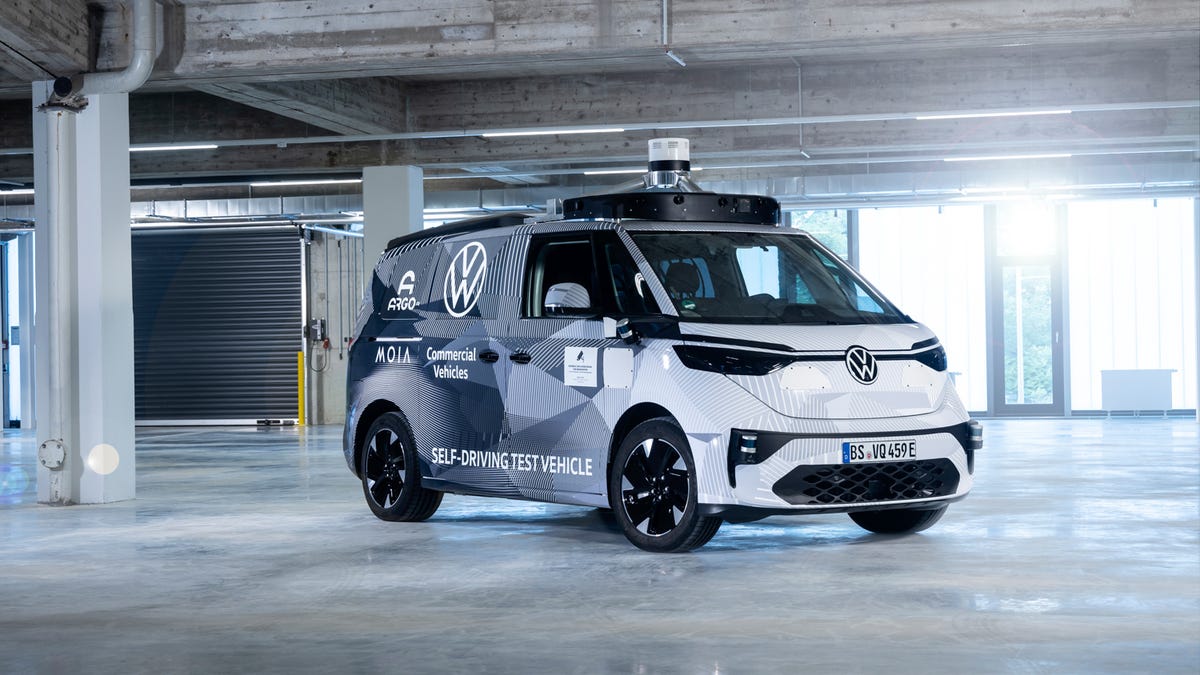ID Buzz AD previews VW's long-awaited EV family hauler
Delete the sensors and you've finally got a good look at how VW's production ID Buzz will look.
It's been a long time since I first cruised through Pebble Beach in Volkswagen's neon ID Buzz concept. Four years, in fact, since I sat in that bright and sunny cockpit and idled around in a concept car that made absolutely everyone smile. Now Volkswagen is giving the world its first proper look at a proper production version in a very special trim: autonomous.
This is the Volkswagen ID Buzz AD, and no, that two-letter designator has nothing to do with the cycle of the calendar. It's an indication of the autonomous nature of this bus, thanks to a heavy injection of tech from VW partner Argo AI. Argo, which we've previously seen fussing up Ford products in Miami, has applied its Argo SDS (Self-Driving System) here to create a family-hauler that will, eventually, fully haul itself.
The van was unveiled at Volkswagen's Group Night event on Sunday ahead of this year's Munich Auto Show. There, VW chairman of the board of management Herbert Diess said, "Autonomy will change this industry like nothing we've seen before," going on to say that "autonomy will entirely change our world," too. But, unlike so many proclamations and too-near dates for those radical changes over the years, Diess chose a seemingly moderate deadline.
2030 is when Diess says autonomy will begin to have an impact on the auto industry. By then, he hopes that a majority of VW's passenger vehicles will be EVs and that autonomous services will start to impact the overall economy of their business. Vehicles much like this one.
In that way, the ID Buzz AD isn't really intended as a package for you or me to buy. It's still largely a development and testing platform that will one day evolve into a transportation service. You know, something like an Uber or Lyft, just minus the driver. While autonomous services won't have an impact for nearly another decade, they'll be in testing here in Germany in the coming months and will have limited commercial deployments by 2025.
That's some headgear.
How does it work? It takes a lot of sensors, naturally. The most noticeable is the long-range lidar scanner mounted way up high above the roof, providing 360-degree visibility at a range of up to 400 meters. That's augmented by a half-dozen shorter-range lidar scanners festooned all over the car, plus 11 radar panels, a series of cameras at various focal lengths and even microphones. That's all paired with Argo's Complementary Autonomous Vehicle System, which hoovers up all that data and creates a comprehensive look at the world around.
These buses will still feature human drivers while testing, a fleshy feature unlikely to disappear for many years to come. As to when you can get your own fleshy bits in a non-autonomous ID Buzz, that remains to be seen, but Volkswagen previously promised a production version by 2023. From what we can see under all that vinyl camouflage, it seems to have made the transition from concept to production reasonably unharmed, and that's very good news indeed.


